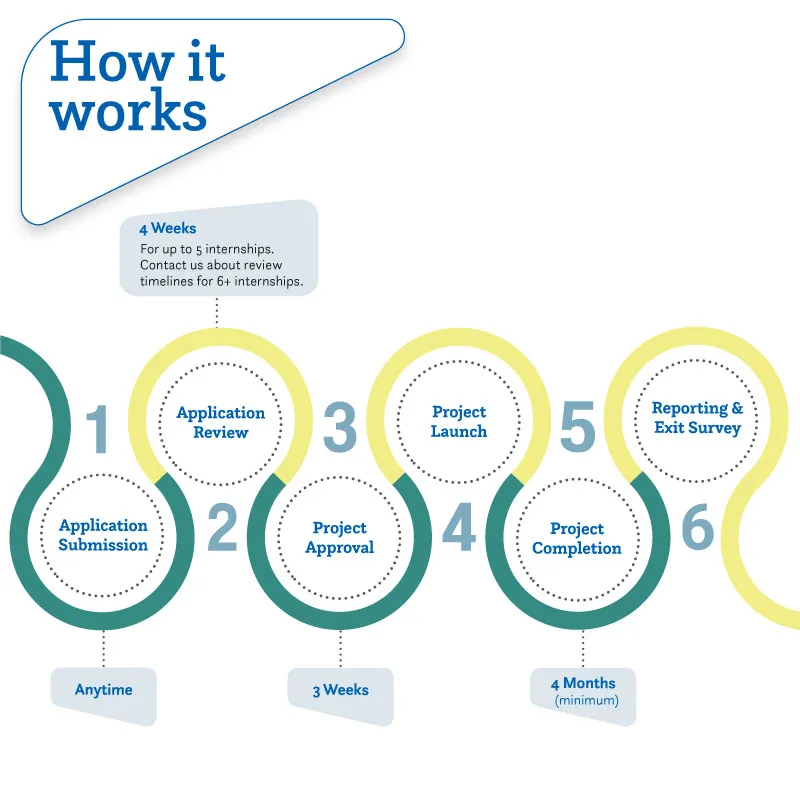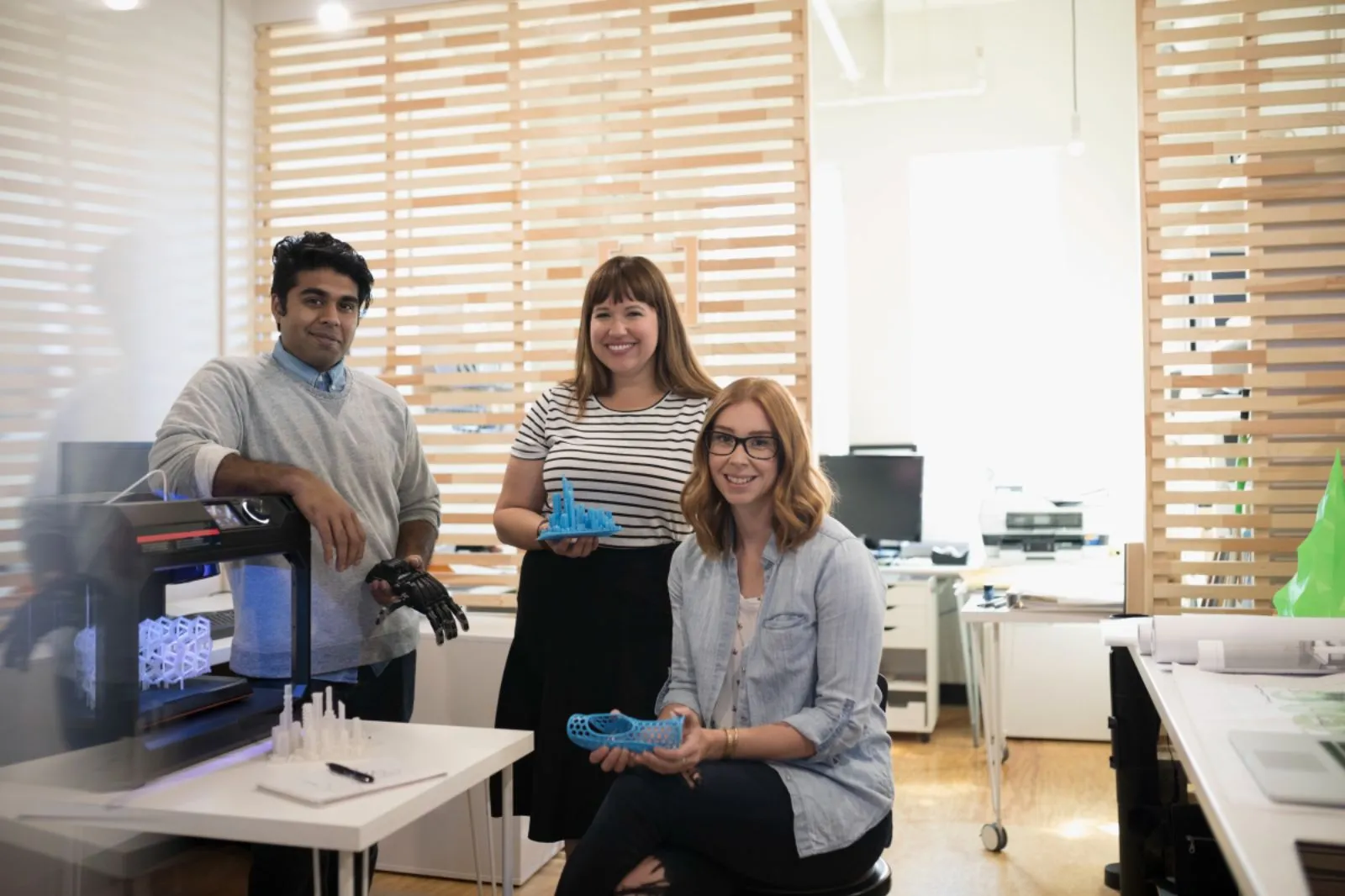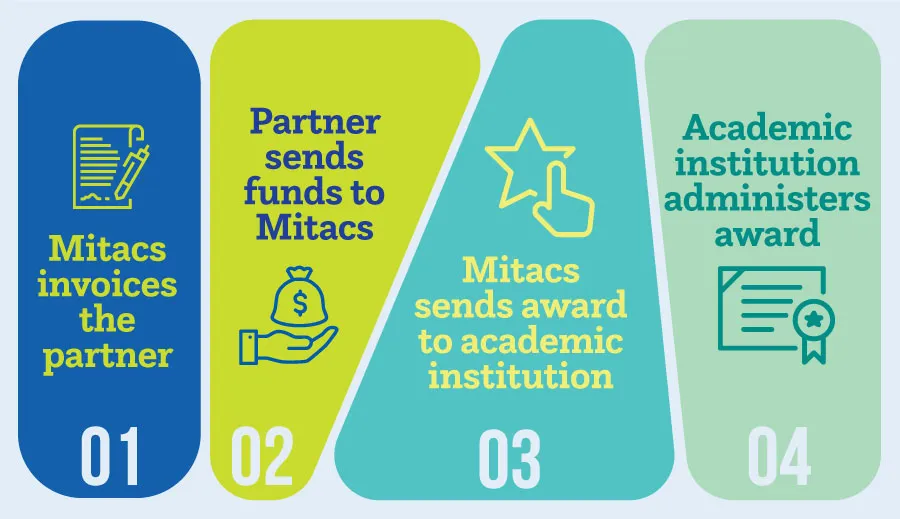Program Details
You are encouraged to contact your local Mitacs Advisor before drafting your application.
About the program
In partnership with Canadian academic institutions, Mitacs is pleased to offer the Business Strategy Internship (BSI). The award provides either $10,000 or $15,000 per intern to allow them to undertake a four-month internship project with a partner organization in Canada. Interns will work with their academic supervisor to co-design a project with their partner organization to work on the organization’s innovation activities, helping them improve their products, processes, or services. Throughout the internship, Mitacs provides online professional development courses to interns through our e-Campus, EDGE.
The BSI program aims to:
- support innovation to generate knowledge and its transfer between academic and non-academic sectors
- strengthen the innovation capabilities of partner organizations
- support the creation and ownership of intellectual property in Canada
- promote collaboration between sectors by reducing the risk for companies to engage in innovation
- provide work-integrated learning and professional skills training to increase employability of post-secondary students
- ensure and promote equitable access by underrepresented groups to foster inclusive innovation
Innovation projects are expected to lead to change and improvements for the partner and/or community, through exploration, design, and implementation of improvements/efficiencies in business models, products, processes, or service delivery.
Details
- The BSI program will provide an award of $10,000 per intern with the full amount of the award going towards intern stipend. The partner organization will contribute $5,000 towards the award.
- Alternatively, partner organizations can select a $15,000 funding model where up to $5,000 of the funds can be used for eligible project costs (see Funding/Use of Funds section below) or to top up an intern stipend. Any combination of funding is allowed as long as the minimum intern stipend is $10,000 and the minimum partner organization contribution is $7,500.
- Projects should be designed as four-month internships, however, they can be adjusted to six-month internships to provide flexibility to accommodate the intern’s other responsibilities.
- Projects will be designed to address one or more business innovation components (i.e., marketing, operations, finance, intellectual property (IP), etc.) dependent on the needs of the organization.
- Projects submitted to Mitacs will be adjudicated to ensure that the participants meet the necessary requirements and that the work outlined is eligible for the program.
- Each project will require supervision from a supervisor at the partner organization and an academic supervisor or a point of contact appointed by the institution to oversee the work and the intern.
- Interns are expected to meet weekly with both supervisors to report on the progress of their project. Virtual meetings are acceptable.
- Interns and both supervisors will be required to complete an exit survey at the end of the program reporting on project outcomes, skills developed and providing feedback on the program experience.
- Interns will deliver a final presentation to their supervisors summarizing the work at project completion.
Project Extension
Mitacs project extensions are now available to Business Strategy Internship (BSI) project holders who need more time to complete the objectives and deliverables as outlined in an approved Mitacs project. Though this streamlined application and adjudication process (with additional financial commitment from the partner organization), eligible applicants may extend the original project timeline by adding up to one internship unit (IU) per intern per project. Project extensions can be used to overcome unexpected challenges, to incorporate additional scope, or to allow additional time to support implementation of results.
You are eligible to request an extension in your project if:
- At least 75% of your initial project is completed or your project has ended less than 4 months ago;
- The extension is requested to complete the initial objectives of the project;
- The extension request is for 1 internship unit per intern to a maximum of 10 internship units per project;
- The partner in the project will provide an additional contribution leverage by Mitacs with our standard funding model (see below).
Applications are often reviewed by Mitacs in as little as 3 weeks to keep projects moving forward with minimal delay.
For full eligibility criteria or to apply for a project extension, see this form. Completed forms should be submitted to your local Mitacs Advisor for revision and official submission to Mitacs for evaluation.
Funding
The BSI program provides an award of $10,000 per intern per four- or six-month internship, with the full amount of the award going towards intern stipend. The partner organization will contribute $5,000 towards the award.
Alternatively, partner organizations can select a $15,000 funding model where up to $5,000 of the funds can be used for eligible project costs (see Funding/Use of Funds section below) or to top up an intern stipend. The minimum intern stipend for all units is $10,000 and the minimum partner organization contribution is $7,500.
For information on eligible expenditures, please review our Use of Funds policy.
Eligibility
The Business Strategy Internship (BSI) program is offered in partnership with Mitacs’s academic partner institutions. Interested applicants should read through the criteria below to ensure they are eligible for the program before applying through the Registration and Application Portal (RAP).
All projects require supervision from a supervisor at the partner organization and an academic supervisor or a point of contact appointed by the institution to oversee the work and the intern. The project must be designed to address one or more business innovation components (i.e., marketing, operations, finance, intellectual property (IP), etc.) dependent on the needs of the organization.
BSI projects must take place in Canada with Canadian partner organizations.
Mitacs offerings are available to our Canadian member and participant postsecondary institutions.
This program requires three core participants: an eligible intern, an eligible academic supervisor and an eligible partner organization.
Academic supervisors
- Academic supervisors are eligible if they are faculty at a Canadian academic institution who are eligible to hold Tri-Agency funds.
Partner organizations
- Partner organizations can be for-profit corporations (must receive more than 50% of their funds from non-government sources), eligible not-for-profit corporations, municipalities, or hospitals in Canada.
- Eligibility can be confirmed with a Mitacs Advisor.
Intern
An intern can be a Canadian citizen, a permanent resident, international student with a student visa, or international postdoctoral fellow with a valid work permit. Interns must be 18 years old or over, and fall into one of the following categories:
- Registered students and postdoctoral fellows at Mitacs partner colleges and universities in Canada. Postdoctoral fellows are eligible if the date of graduation from a PhD program is less than five years to the start date of the project. Exceptions are available for extenuating circumstances such as parental leave or military service. Fellows must not have been employed full-time at the partner organization prior to applying.
- Recent graduates (must be within two years of graduation at the start of their project), and non-degree students (diploma, certificate, etc) are eligible at the academic institution’s discretion. (Any interested applicants should check with their institution to first determine whether they are able to support other types of university interns before drafting an application.)
- Visiting students and researchers at Canadian academic institutions who are completing a degree at a university abroad may also be eligible at the discretion of the Canadian institution.
- How many internships can one intern do?
- Post-secondary students are eligible for any number of internships at the discretion of their institution. Interns must be enrolled as a student at an eligible institution throughout the course of the internship and have time in their schedule to commit to the project.
- Postdoctoral fellows can do up to nine (9) four-month internships (up to three (3) years)
- Recent graduates can complete up to three (3) four-month internships within two years of their graduation date
- Interns may not participate in more than one internship at the same time.
Further, all parties must declare any potential conflicts of interest upon application submission, including:
- An academic supervisor in a position of ownership, employment or influence over operations at the partner organization.
- An intern is in a position of ownership, employment or influence over operations at the partner organization.
- Programs participants with a close family relationship with each other, or with someone in a position of ownership employment or influence at the partner organization.
Interns may interact remotely with an international partner organization.
How to Apply
Effective December 15, 2025, the Internship Unit (IU) cap for the Indigenous Pathways initiative will increase from 12 to 30 IUs per submission year for each Indigenous partner organization. This gives partners more flexibility when accessing talent to meet their research and development project needs. Please contact your Mitacs Advisor with questions or concerns.
Interested parties can apply directly through the Mitacs Registration and Application Portal (RAP):
- The proposal template will be provided through the RAP.
- You can also download the template for review prior to submission.
- BSI interns cannot have a Conflict of Interest (COI); projects with intern COIs will not be approved.
- Any COIs involving the academic supervisor and the partner organization must be disclosed to Mitacs during the application process and will be reviewed by the Mitacs COI committee. Please refer to the Mitacs Conflict of Interest Policy for more information.
- If a COI exists, we suggest that you contact the Mitacs Advisor for your region prior to starting an application to ensure that you are eligible for the program.
Our digital application process
Once you have confirmed all participant’s eligibility with your Mitacs advisor, you’ll be ready to prepare and submit an application through Mitacs’s Registration and Application Portal (RAP).
Please watch these videos for detailed instruction on how to use the platform.
Kindly note when before preparing your application that:
- The project start date listed in your application should be at least six weeks later than your submission date to allow Mitacs the appropriate time to process your application.
- Your project start date will be confirmed in your Outcome Letter once your project has been approved.
- If you start a project before receiving funds from Mitacs, you do so at your own risk. Mitacs will not reimburse for work completed prior to receiving funding.
If you have any questions about the Business Strategy Internship (BSI) program, please email the Business Strategy Internship team.
Submission Checklist
Requirements for all projects
- The description of the why (background), the what (objectives), the how (approach), and the when (timeline with deliverables)
Requirements for all collaborations
- Objectives must be aligned with the knowledge, skills, expertise and needs of all involved.
- Each party’s roles and responsibilities must be clear to all signatories on the application.
- Each party’s expectations on deliverables, priorities, and time sensitivities must be clear to all signatories on the application.
- Agreement on intellectual property rights, ownership, and royalties must be clear to all signatories on the application.
Requirements for all internships
- A structure is in place to provide academic support that is appropriate to the level of the intern(s).
- There must be sufficient support / supervision from the internship host.
- There must be sufficient capacity at the internship host to manage the planned number of interns.
Requirements for all projects involving Indigenous peoples or communities
- These must have the support of the affected communities and those who have rights or a stake in the endeavor.
- Indigenous communities should have been involved in shaping the project from inception, and Elders and Knowledge holders should have been directly engaged.
- There must be clear agreement on Indigenous communities’ access, use, and governance of resulting knowledge and data.
- The project team must demonstrate the capacity to engage with Indigenous communities or partners in line with appropriate guidelines, principles, and policies. For more information please refer to our Indigenous Research Guidelines.
How it works
Application submission
- Prospective interns and/or academic supervisors apply to the program through the Mitacs Registration and Application Portal (RAP) and complete all sections of the application.
- All participants (intern, academic supervisor, partner organization) sign off on the application through the RAP.
- The lead applicant downloads the completed project proposal and ORS sign-off template and sends to the ORS or equivalent office for review and signature.
- The lead applicant uploads the ORS signature page to the RAP and submits the application.
Application review (approximately four weeks)
- Mitacs receives the application and reviews against selection criteria while checking for eligibility and completeness.
- Partner organizations are invoiced for their contribution upon application submission.
- Applicants may be asked to revise their project proposal if sections are incomplete.
Project approval (approximately three weeks)
- Project start dates cannot pre-date the Approval letter you receive from Mitacs.
- Once the project is approved and all partner contributions have been received, award funds are released to the intern’s academic institution to be paid out to the intern.
Project launch to completion
- Project work should not start until the intern has received the funds from the academic institution.
- Projects can be 4 or 6 months long. A part-time option for interns is available for 6-month projects, please consult your local Mitacs Advisor
- Note that projects are limited to two (2) years in duration. Participants are welcome to submit a continuation of the project in a new proposal for remaining project work they’d like to continue.
Reporting and exit survey
- All participants (intern, academic supervisor, partner organization) are required to complete an exit survey within 30 days of the project end date.
- Academic institutions are required to submit a Financial Report to Mitacs once all project funds have been paid out.
Additional resources for partner organizations:
 MITACS TERMS, CONDITIONS & POLICIES
MITACS TERMS, CONDITIONS & POLICIES
View and download our documents
Program Administration
Mitacs invoices a partner organization upon submission of their BSI proposal. Upon receipt of the partner’s contribution, Mitacs forwards the award to the Canadian academic institution. No funds will be released to the academic institution until the invoice has been paid and the proposal is approved. Mitacs has no control over when funds are administered by the academic institution. If you have questions about your BSI award after Mitacs has released funds, contact your academic institution’s Office of Research Services (or equivalent).
Start Date and End Date Policy
Projects must adhere to the Start and End Date Policy.
Projects that exceed the limits stated in the policy will expire and be slated for cancellation. Participants who anticipate exceeding the limits should contact Mitacs with an explanation and request an adjustment to the project timeline.
All Mitacs-funded projects must adhere to the Mitacs Intellectual Property Policy. The following academic institutions have their own IP policies for Mitacs projects.
Brock University
Note that these IP agreements may not apply to joint applications with other funding organizations.
Please be advised that the Business Strategy Internship has limited availability. You are invited to validate current availability here or contact your local Mitacs Advisor before drafting your application.
All submitted Business Strategy Internship (BSI) applications are reviewed for project quality, eligibility, and completeness. You will be notified by Mitacs if your application is ineligible or incomplete within four weeks of submitting your application. Please refer to the submission checklist below for more information.
Mitacs will also assess the benefits of the proposed activity in terms of the economic and societal impact of the project; the development and deployment of talent; and the establishment and support of collaborations. A project does not need to demonstrate benefits under every category (project, talent, and collaboration) since a weakness in one category can be compensated by strengths in another. However, projects that demonstrate little or no benefit across all categories will not be approved by Mitacs.
In addition to assessing the benefits of a project, each project will also be reviewed to ensure that it does not pose any unmanageable risks in the categories of feasibility, loss of talent or international assets from Canada, economic and national security risks, and adverse effects on humans, animals, and/or the environment. Projects involving high risk must demonstrate correspondingly high benefits to Canada and appropriate risk mitigation measures to justify approval by Mitacs.
While the selection process is not currently competitive, if funding does become limited, Mitacs will prioritize approval based of the potential cumulative benefits on the proposed activity.
Project
Examples of how a project can demonstrate the potential for economic and societal impact include, but are not limited to:
- creating or commercializing Canadian technology / intellectual property
- discovering new and broadly applicable knowledge
- enhancing Canadian productivity by developing new and improved processes
- supporting the entry of Canadian businesses into new domestic / international markets
- developing new business models for Canadian companies
- improving public services (e.g. transportation infrastructure, utilities, healthcare) in Canada
- contributing new solutions to community challenges in Canada
- addressing social or environmental issues important to Canadian society
- advancing new approaches to include under-represented groups in the knowledge economy
- working towards a more equal and equitable Canada
- implementing evidence-informed strategies to address a specific challenge
Talent
Examples of how a project can demonstrate the potential for supporting the development of a talented and skilled population include, but are not limited to:
- interns gaining specialized technical skills through access to and training on the use of specialized equipment and facilities
- training interns in research skills
- training interns in interdisciplinary teamwork
- training interns in community-based methodologies
- training interns in entrepreneurial / professional skills through structured activities
- creating opportunities for interns to apply their knowledge / skills and solve industry / real-world problems
- re-skilling / up-skilling interns to pursue new and emerging opportunities in Canada
- placing interns in positions (at Canadian companies or organizations) appropriate to their training / skills
- interns being introduced to new professional experiences / environments / contacts / networks in Canada
- supporting individuals from under-represented groups in the knowledge economy
Collaboration
Examples of how a project can demonstrate the anticipated benefits associated with collaboration include, but are not limited to:
- bringing people together to solve problems though complementary skills and expertise
- sharing access to data, facilities, instruments for mutual benefit
- exchanging knowledge among academia, industry, communities
- moving tacit knowledge into practice through interdisciplinary teamwork
- supporting long-term relationships among academia, industry, communities
- establishing new collaborations among academia, industry, communities
- attracting foreign investment, talent, and innovative companies to Canada
- creating partnerships with communities that are under-represented in the knowledge economy
- linking Canadian researchers to prominent research groups globally
Responsibilities
All participants in Mitacs programming are expected to:
- Adhere to the commitments laid out in the Mitacs project, and notify Mitacs of any changes to project scope or timelines.
- Behave in a respectful and civil manner through your gestures, words, and relations with others throughout your program participants, and avoid any form of harassment, discrimination, or incivility.
- Adhere to any all relevant procedures and protocols of your academic institution or host organization
Additionally, participants in the Business Strategy Internship (BSI) program have the following roles and responsibilities.




